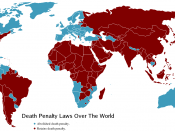Capital Punishment Capital punishment is defined, as the taking of one's life for another, as punishment for crimes proved to have been committed. One example could be by execution of the guilty party or by lifetime incarceration. As an assurance that the perpetrator will no longer be free to commit further crimes. For some people issues arise, like whether the taking of a life for a life, is not in itself, another form of murder; but a decision that is handed down by the judicial system that is accepted and morally justified. As children we are brought up believing that in order to maintain a certain lifestyle that is respectable and civil, we must establish a code of moral ethics, by which one should live by, one of which protects the right for every person born to live his or her own life in a manner that does not inflict harm or take away in any manner the life support system of another human being.
The effects of the above decisions can take several forms. Understandably, through the eyes of the victims' families, the death penalty is not too severe a punishment; for all that they have lost and suffered. To them this enactment is justice. To others, the death penalty is cruel and inhuman, they are advocating the fact that the enforcement of a life for a life, in itself, perpetration of a crime. We do not find our governing bodies handing down rulings to burn down the arsonists' home, or an order to rape the rapist. It is tantamount to the taking of a life for a life, in some peoples' opinion.
There seemingly are pros and cons as to evidence supporting the death penalty, as being a deterrent to crime. While supporters of the maximum penalty exist, another viewpoint questions the morality of the taking of a life. Suggesting that life behind bars, away from those we need to nurture our existence, is not cruel and inhuman and a consciously livable alternative. In addition, that somehow, perhaps through the grace of God, a human could possibly reform and even given a second chance to step back out and again intervene with society.
The true victims are the families' of murder victims. An execution finalizes an outcome for the perpetrator, but for the families, there is no closure. Their expectation is to pursue the highest degree of punishment, in the form of the death penalty. Rightfully so, their loss has been great and unexpected. They must continue on and contend without the presence of a loved one who would have otherwise have been there. It is alittle more acceptable if the loss is due to natural causes, that we are not capable of changing.
In conclusion, there is no visible proof that the death penalty is a deterrent of crime. Nor has it proved that crimes have lessened, or become less violent. However, justification certainly can not be found in supporting a lifestyle of any magnitude, of one who has taken the life in any form from another, and perhaps allowing this unforgiving act to occur yet again is unthinkable. The idea of an eye for an eye, would perhaps keep the human race in the boundaries of what we have been brought up to believe is moral and ethical. It is not for another to decide who may or may not live. It is not the place of a single individual to act as a holy being and take away another human beings life.





